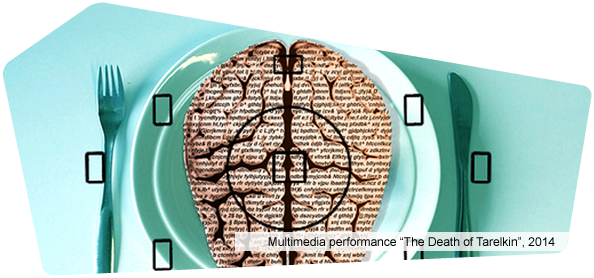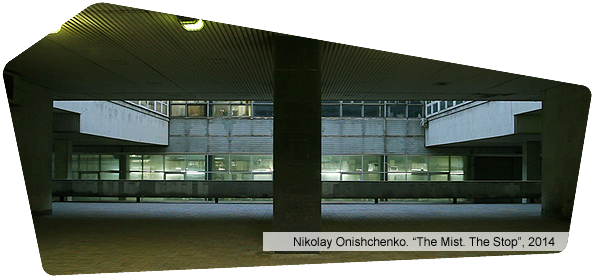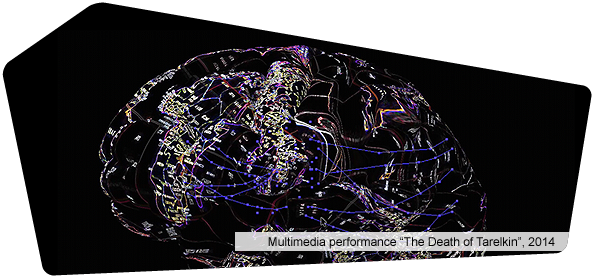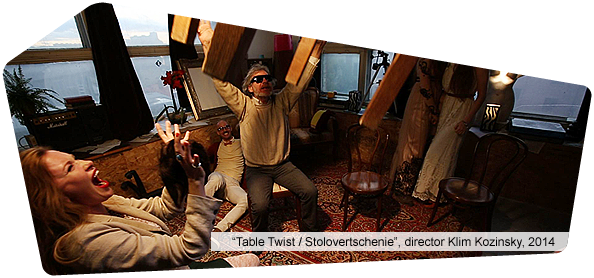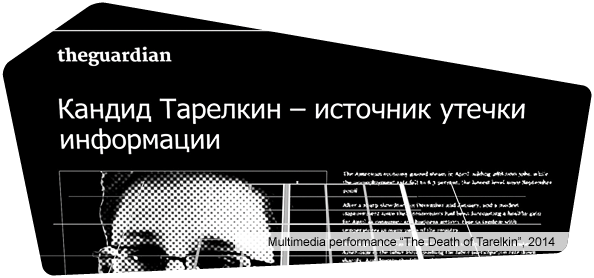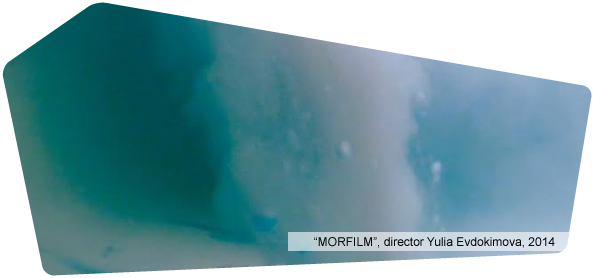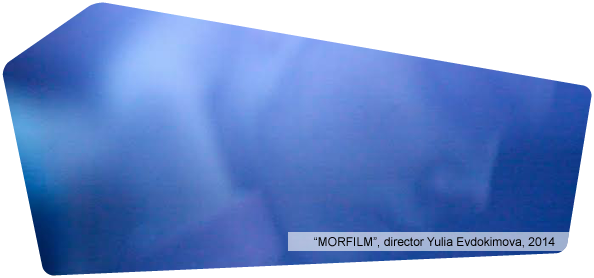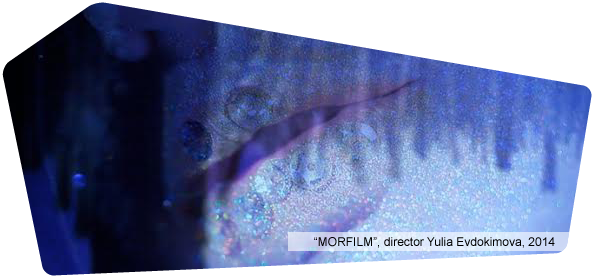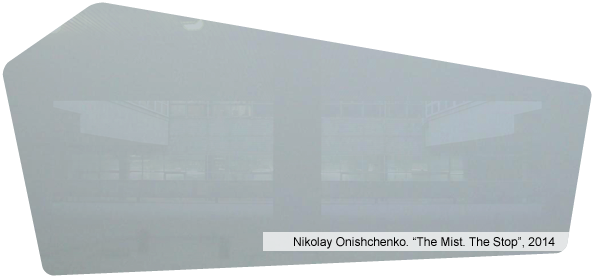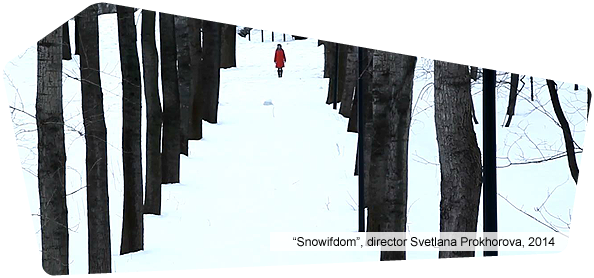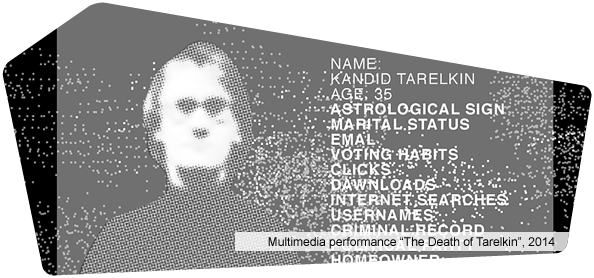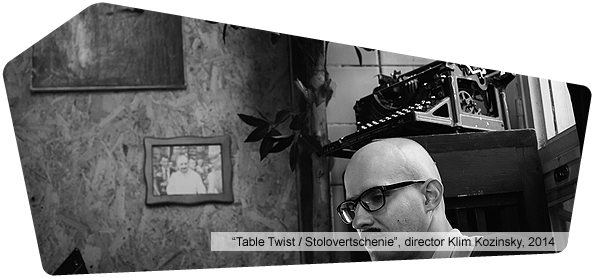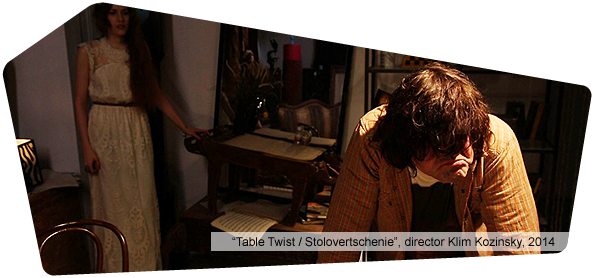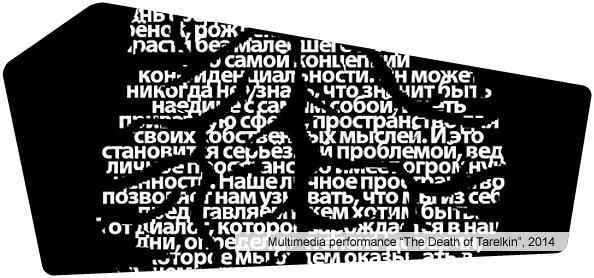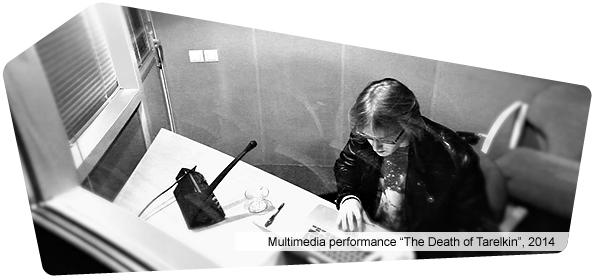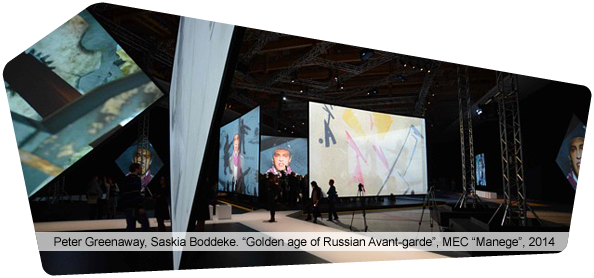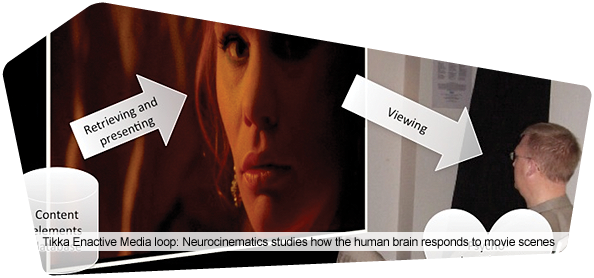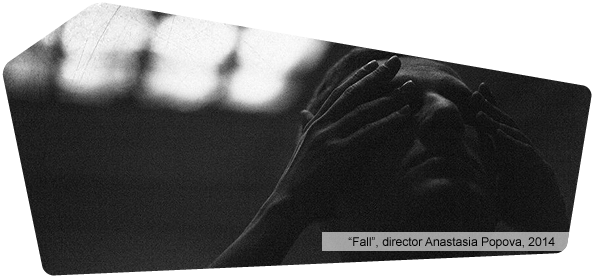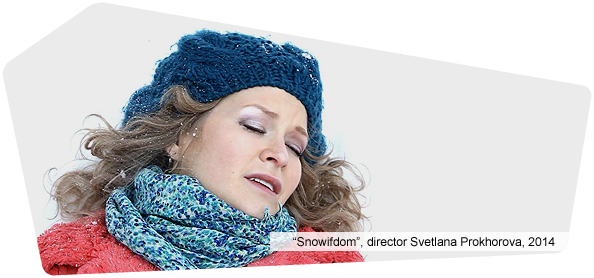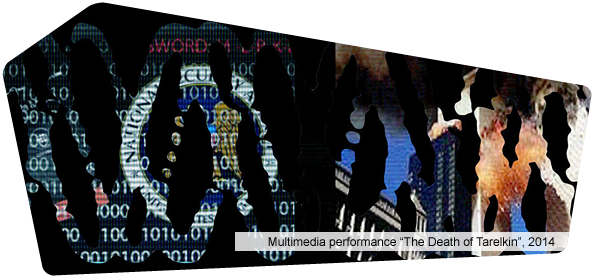About Media Forum

Schedule

Conference “From Montage of Attractions to Neurocinema”

Nikolay Onishchenko. Exhibition “Mist. Halt”

Kino-harakiri Interactive Show

Multimedia performance “The Death of Tarelkin”

For Press

Partners

Contacts
Conference "From Montage of Attractions to Neurocinema"

June 23, 2014, 12:00—20:00
Central Exhibition Hall MANEGE. Manezhnaya Sq., 1
Participants: Naum Kleiman (Russia), Alexander Deryabin (Russia), Nikolai Izvolov (Russia), Kirill Razlogov (Russia), Pia Tikka (Finland), Lyubov Bugaeva (Russia), Sergey Filippov (Russia), Boris Yukhananov (Russia), Alexey Nadzharov (Russia), Alexandra Dementieva, (Belgium/Russia)
“We understand a work of art first of all as a tractor, plowing through viewer’s psyche within a given class set-up,” – wrote Sergey Eisenshtein in 1924 during his work on the Strike / Stachka. In spite of this metaphor, suggesting that spectator’s conscience is either an untilled field or a virgin soil, Eisenstein was interested in the viewer’s active engagement and possibilities of influencing her/him by means of film. Almost a century later, artists and film directors, researchers of enactive cinema, rely on the authority of Battleship Potemkin and Ivan Grozny creator. They do not forget, however, to mention his tutor – theatre director Vsevolod Meyerhold, architect and designer El Lissitzky, and psychologist Lev Vygotsky.
If interactive cinema offers viewers a direct choice, let’s say, of a character’s fate or a development of narrative in a movie or a TV series, enactive cinema works with psycho-physic or emotional reactions of the viewers. Besides screens it implies the use of bio-censors and audiovisual tracking of viewer's behavior. The latter ensure literal connection of a viewer with the screening, which changes according to her/his state.
The first enactive cinema was developed and installed in the Museumof Contemporary Art Kiasma, Helsinki in 2005 by Pia Tikka, who is currently developing the first enactive long drama film “Maiden of Dusk”. However, despite of several articles about the conceptual and practical implementation of enactive cinema, it still remains a “beast of unknown kind” for many. Enthusiasts draw such possibilities as collective screenings of personal dreams within a friendly circle or on youtube, which appear more as a fantasy plot or a dream of psychotherapists and marketers so far. On the other hand, still ten years ago a possibility to phone a person and actually see her being at the other side of the continent also did not seem quite real.
This is why organizers of Media Forum of the IMFF decided to arrange a meeting of film critics and film historians, who have things to say about avant-garde in cinema, and of researchers opening way to enactive cinema (they are always ready to emphasize its difference from interactive technologies), as well as artists, film directors, musicians, who work at the borders between art and science.
The first of the three sections of the conference is devoted to experiments of cinema avant-garde. Presenting are: Naum Kleiman, director of the Cinema Museum and one of the best connoisseurs of Sergey Eisenstein’s work, film historians Nikolay Izvolov and Alexander Deryabin, film and culture historian Kirill Razlogov.
Presentations and discussion within the second section are devoted to contemporary scientific quest in the field of neuro- and enactive cinema. Among participants – artist Pia Tikka, director of the movies Obsession, The Queen, author of the book Enactive Cinema: Simulatorium Eisensteinense (2008), initiator and active participant of research project Enactive Media (2009-2011) in Aalto University (Finland). Among other presenters: Lyubov Bugaeva (Russia, St.Petersburg State University), Sergey Filippov (Russia, Moscow State University).
Artists, film directors, music composers are also participating in the conference. Multidimensionality of psychic effect of music, cinema and theatre will be addressed by the Russian Belgian-based artist Alexandra Dementyeva, Australian Tina Gonsalves (in her 2009 video installation Chameleon the images on the screen were reactive to viewer's emotions), composer Alexey Nadzharov (Russia), and film director Boris Yukhananov (Russia), one of the founders of the «Parallel Cinema» movement.
Entrance with the tickets - 150 rur
Programme
June 23, Monday, 12:00 — 20:00
Part 1. Experiments of the cinema avant-garde.
Part 2. Contemporary research in the field of neurocinema and enactive cinema.
Part 3. Multidimensionality of psychic effect. Music, cinema and theatre.
12:00 — 14:00
Part 1. Experiments of the cinema avant-garde.
- Naum Kleiman. Film critic, cinema historian. One of the biggest specialists in the work of S.M.Eisenstein. Honored Worker of the Arts of the Russian Federation (1998). Since 1992 – director of the State Central Cinema Museum and Eisenstein-Centre in Moscow.
- Alexander Deryabi. Film historian, research associate of the Research Institute of Film Art of the Russian State University of Cinematography (VGIK)
- Nikolai Izvolov. Film historian and theoretician, head of historical-theoretical section of the Research Institute of Film Art of the Russian State University of Cinematography (VGIK)
15:30 — 17:30
Part 2. Contemporary research in the field of neurocinema and enactive cinema.
- Pia Tikka (Finland). PhD, film director, artist, one of the leading researchers of neurocinema and enactive cinema. Author of the book Enactive Cinema: Simulatorium Eisensteinense (2008). Her project Obsession (within enactive cinema) has been awarded Möbius Prix Nordic prize of interactive storytelling. Pia Tikka has also participated in research of brain capabilities aivoAALTO (2009—2014) and is a founding member of the research project Enactive Media (2009-2011) at the Aalto University (Finland). Her latest project NeuroCine connects practice of movie creation with methods of neurovisualisation, allowing studying the neural basis of cinematographic image.
- Lyubov Bugaeva (Russia). Literature and culture theorist, dozent of philology department of St.Petersburg State University, senior research associate of St.Petersburg branch of the Russian Institute for Cultural Research.
- Kirill Razlogov. Film and culture theorist. Director of the Russian Institute for Cultural Research
18:00 — 20:00
Part 3. Multidimensionality of psychic effect. Music, cinema and theatre.
- Boris Yukhananov (Russia). Film director, artist, film and video theorist, poet, author of critical articles, art director of the Moscow Drama Theatre named after K.Stanislavsky, one of the founders of cinematographic movement «Parallel Cinema» in Russia.
- Alexey Nadzharov (Russia). Associate of the Centre for Electroacoustic music of the Moscow Conservatoire, composer; collaborates with a number of diverse music projects.
- Alexandra Dementyeva (Belgium/Russia). Media artist, works with interactive projects. All of her works are formed around a clearly expressed idea of interaction between an artwork and a viewer, emerging due to the new technological approaches to image creation.
Venue
Central Exhibition Hall MANEGE
Manezhnaya Sq., 1
www.moscowmanege.ru
Contacts
Anna Buali
+7 (926) 582-02-81
bualianna@gmail.com

